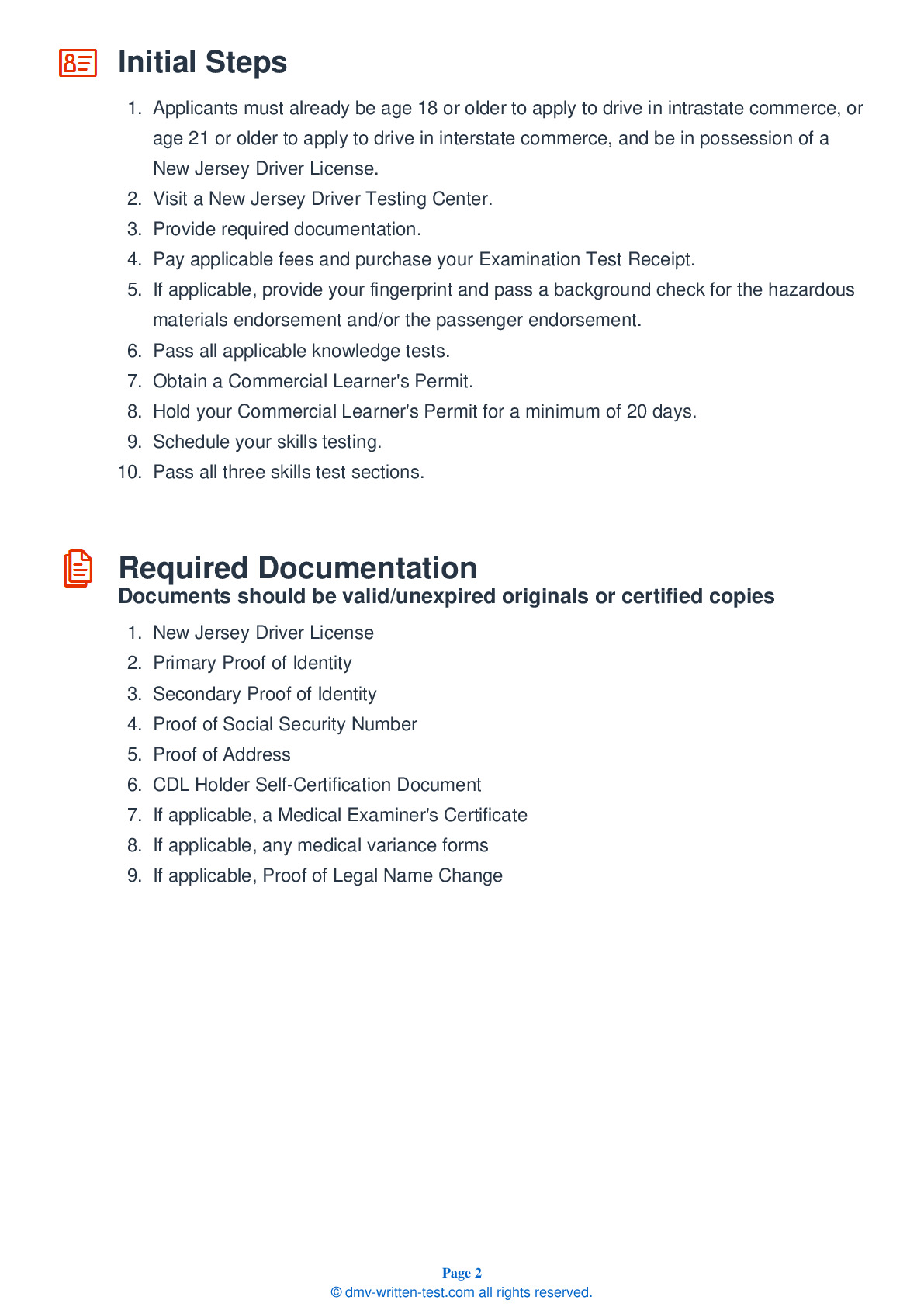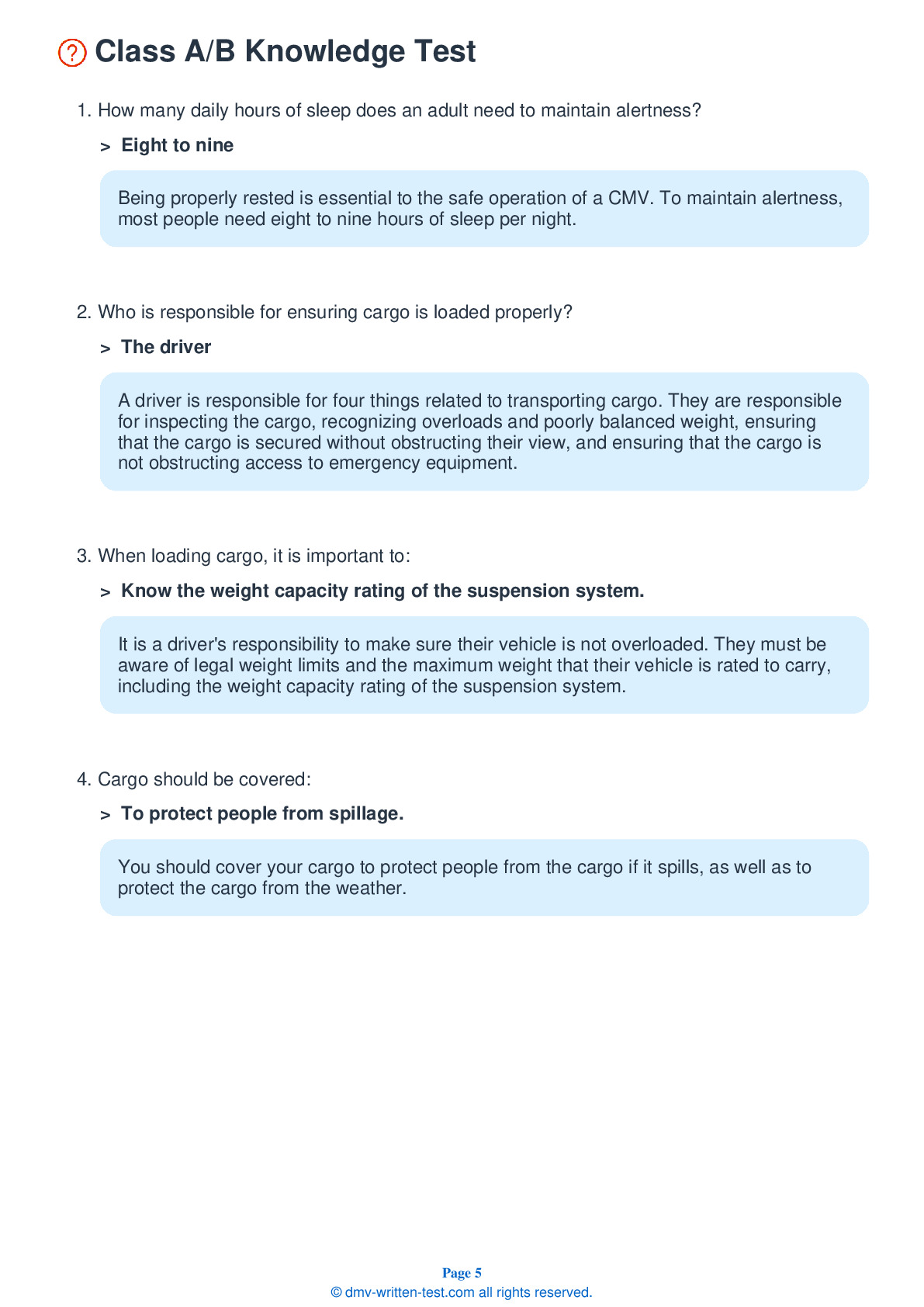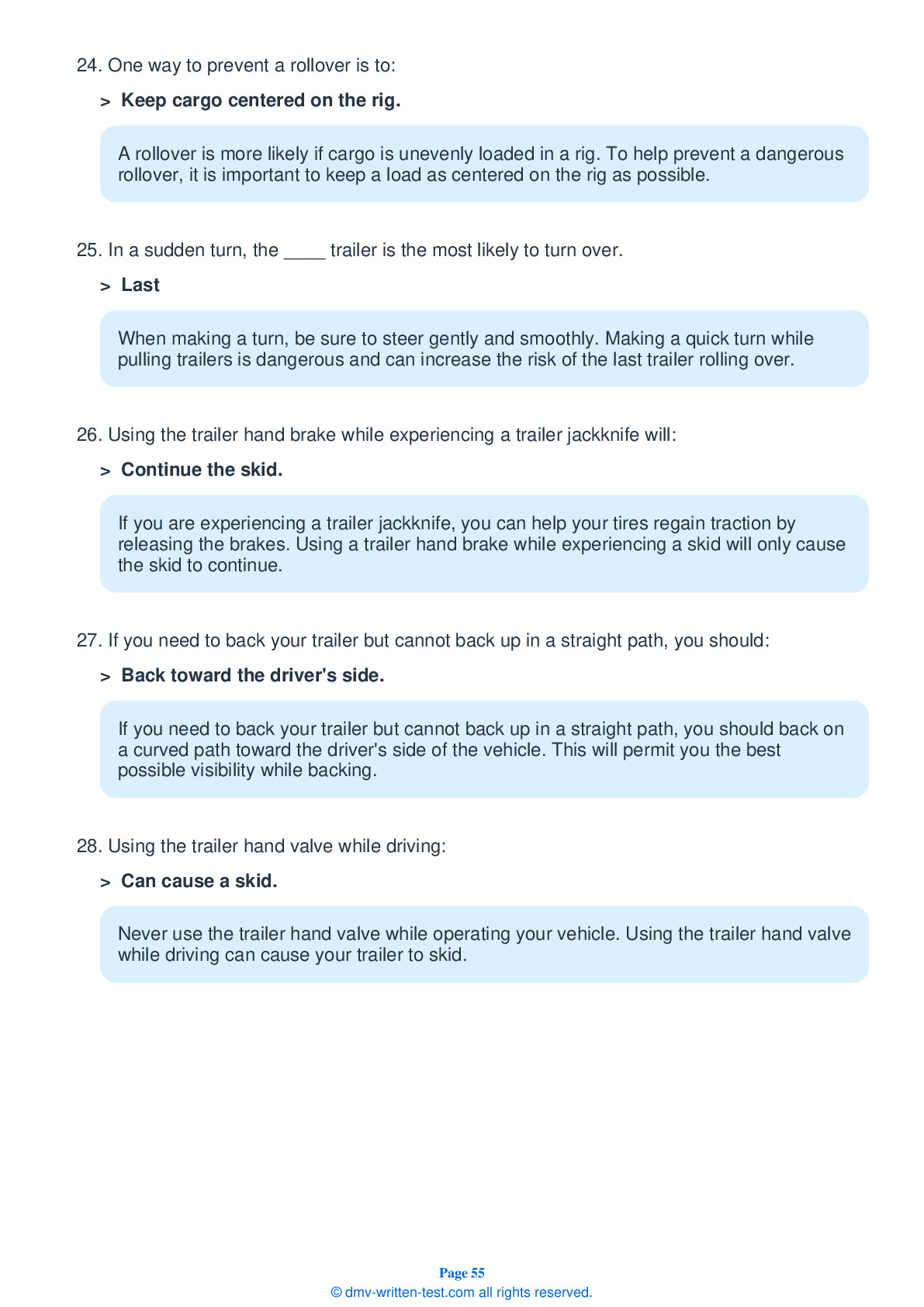Knowledge Test Class A
This license is required for driving any legal combination of vehicles, with a gross combination weight rating of 26,001 pounds or more, provided the GVWR of a trailer exceeds 10,000 pounds To receive this license, applicants must pass a 50-question test. To pass, applicants must answer 40 questions correctly. Each question has four possible answer choices. Test questions come from the New Jersey Commercial Driver License Manual. Questions come from chapters covering: Introduction, Driving Safely, Transporting Cargo Safely, Air Brakes (if applicable), Pre-Trip Vehicle Inspection Test, Basic Vehicle Control Skills Test and On-Road Driving.. Endorsements that may be used with a Class A CDL are: Hazardous materials, Tank, Passenger, HazMat and Tank, Air Brakes and School bus.
1. When traveling down a long downgrade, you should brake by:
On a downgrade, you should use the braking effect of your engine as the principal way of controlling your speed. Save your brakes for additional slowing or stopping that may be required by road or traffic conditions.
2. If cargo on a flatbed trailer is 40 feet long, it must be secured by a minimum of:
On flatbed trailers and trailers without sides, cargo must be tied down. There should be at least one tie-down for every 10 feet of cargo. Regardless of the size of the cargo, at least two tie-downs must be used.
3. Sending text messages while driving:
Sending and reading text messages while driving is prohibited.
4. During an applied leakage test, the maximum leakage rate for a single vehicle with air brakes is:
It is important to know the maximum air loss rate that is safe for your specific vehicle. A single vehicle with air brakes should have a leakage rate no higher than 3 psi in a minute during an applied leakage test.
5. When loading a trailer, it is important to:
The weight of cargo in a trailer should be evenly balanced. Having too much or too little weight on an axle can interfere with proper control of the vehicle. Additionally, having too much weight on one axle can damage it.
6. When asked about the vehicle's oil during the vehicle inspection test, you must be able to do all of the following, except:
During the vehicle inspection test, you must be able to indicate where the oil dipstick is located; show that the oil level is within a safe operating range; and show that the oil level is above the refill mark.
7. Pressing and releasing the brake pedal unnecessarily can:
On a vehicle with air brakes, pressing and releasing the brake pedal unnecessarily may let air out of the braking system faster than the compressor can replace it. This may cause the system's air pressure to become too low and the brakes to stop working.
Frequently Asked Questions
To obtain a Class A CDL in New Jersey, you must pass both a written knowledge test and a skills test, which includes a pre-trip inspection, basic vehicle control, and on-road driving test. You must also meet certain eligibility requirements, including being at least 18 years old (21 years old for interstate driving), having a valid medical certificate, and having a valid New Jersey driver's license.
1. Combination vehicles with a total weight of 26,001 pounds or more, provided that the vehicle being towed has a weight of over 10,000 pounds.
2. Tractor-trailers or semi-trucks.
3. Truck and trailer combinations.
4. Livestock carriers.
5. Flatbeds.
6. Tanker trucks carrying liquids or gases.
7. Double and triple trailer combinations.
It is important to note that you may also be required to obtain additional endorsements to operate certain types of vehicles or carry certain types of cargo, such as hazardous materials or passengers.
1. Age: You must be at least 18 years old to drive intrastate (within New Jersey) and 21 years old to drive interstate (across state lines).
2. Valid Driver's License: You must possess a valid New Jersey driver's license.
3. Medical Certificate: You must provide a valid medical certificate that meets the federal medical standards.
4. Knowledge Test: You must pass a written knowledge test based on the Class A CDL manual, which covers topics such as vehicle inspection, basic control skills, and safe driving techniques.
5. Skills Test: You must pass a three-part skills test consisting of a pre-trip inspection, basic control skills, and an on-road driving test.
6. Background Check: You must undergo a background check and disclose any prior driving offenses or convictions.
7. Fees: You must pay the appropriate fees for the knowledge test, skills test, and licensing fees.
It is important to note that additional endorsements may be required to operate certain types of vehicles or carry certain types of cargo.
1. T-Double/Triple Trailers Endorsement: This endorsement is required for drivers who plan to operate combination vehicles with two or three trailers.
2. P-Passenger Endorsement: This endorsement is required for drivers who plan to operate vehicles designed to carry 16 or more passengers, including the driver.
3. N-Tank Vehicles Endorsement: This endorsement is required for drivers who plan to operate vehicles designed to transport liquids or gases in bulk containers.
4. H-Hazardous Materials Endorsement: This endorsement is required for drivers who plan to transport hazardous materials in amounts requiring placards.
To obtain these endorsements, you must pass additional knowledge and skills tests specific to each endorsement. Additionally, you may need to undergo a background check and meet certain eligibility requirements, such as having a clean driving record and completing specialized training.
1. Pre-Trip Inspection: You will be asked to inspect your vehicle to ensure that it is safe to operate. You will need to identify and explain the proper inspection procedures for various vehicle components, such as the engine, brakes, tires, lights, and mirrors.
2. Basic Vehicle Control: You will be asked to demonstrate your ability to control your vehicle in a controlled environment, such as a driving range or parking lot. You may be asked to perform maneuvers such as straight-line backing, offset backing, and parallel parking.
3. On-Road Driving: You will be asked to demonstrate your ability to operate your vehicle safely on public roads. The examiner will evaluate your ability to follow traffic laws and signals, change lanes, merge with traffic, and complete turns safely.
To pass the skills test, you must score at least 80% on each part of the exam. Additionally, you must not commit any critical errors or too many minor errors during any part of the exam. Critical errors are serious mistakes that could result in an accident or injury, while minor errors are less serious mistakes that do not pose an immediate safety risk.
1. Air Brake Restriction: If you take the skills test in a vehicle without air brakes, you will receive an "L" restriction on your license, which means you are not authorized to operate a commercial vehicle with air brakes. To remove this restriction, you must take the skills test in a vehicle equipped with air brakes and pass the air brake knowledge test.
2. Manual Transmission Restriction: If you take the skills test in a vehicle with an automatic transmission, you will receive an "A" restriction on your license, which means you are not authorized to operate a commercial vehicle with a manual transmission. To remove this restriction, you must take the skills test in a vehicle with a manual transmission.
3. Intrastate Only Restriction: If you do not meet certain federal medical and age requirements, you may be restricted to operating commercial vehicles only within the state of New Jersey.
4. Hazardous Materials Endorsement: If you have a hazardous materials endorsement on your license, there may be additional restrictions or requirements related to transporting hazardous materials safely and securely.
It's important to understand any restrictions or limitations on your license and to comply with all applicable rules and regulations when operating a commercial vehicle.
To take the written test in a language other than English, you will need to visit an MVC office and request an interpreter or a translated version of the test. The MVC will provide you with a translator or translated test booklet at no extra charge.
However, it's important to note that you will still need to be able to read and understand English for certain parts of the test. For example, you will need to be able to read and understand road signs and traffic signals written in English. Additionally, some questions on the test may require you to interpret information presented in English.
If you have any questions or concerns about taking the Class A CDL written test in a language other than English, you can contact the MVC for more information.
To request accommodations, you will need to complete the Request for Accommodation form available on the MVC's website or at any MVC office. You will need to provide documentation from a licensed healthcare professional that verifies your disability and describes the specific accommodations you need. The documentation must be no more than six months old and should be submitted with your request form.
Examples of accommodations that may be provided for the Class A CDL written test include:
- Extended time to complete the test
- A reader or scribe to assist with the test
- Use of a private room or separate testing area
- Use of assistive technology, such as screen readers or magnification software
Once your request is received and reviewed by the MVC, they will contact you to discuss your accommodations and schedule your test. If you have any questions or concerns about requesting accommodations for the Class A CDL written test, you can contact the MVC for more information.
- If you fail the test for the first time, you can retake it the next business day.
- If you fail the test for the second time, you must wait at least seven days before retaking it.
- If you fail the test for the third or subsequent times, you must wait at least 14 days before retaking it.
You will need to pay the testing fee each time you take the test. The fee for a Class A CDL written test in New Jersey is $11.
It's important to note that if you fail the written test three times, you will need to complete a refresher course before taking the test again. The refresher course is designed to help you improve your knowledge and understanding of the material covered on the test.
If you have any questions or concerns about retaking the Class A CDL written test in New Jersey, you can contact the Motor Vehicle Commission (MVC) for more information.




